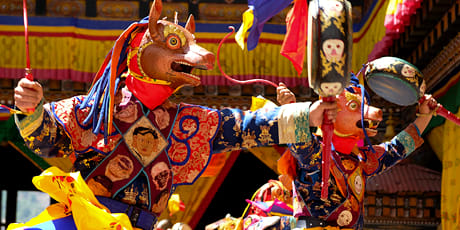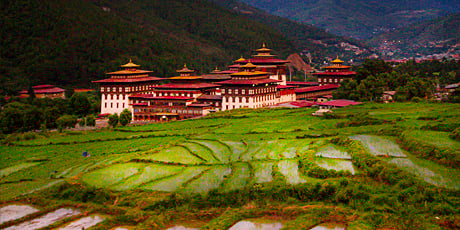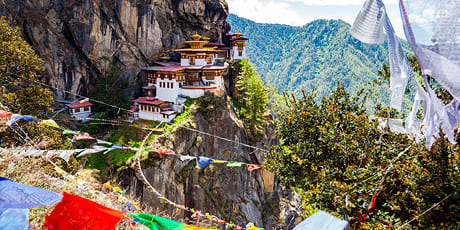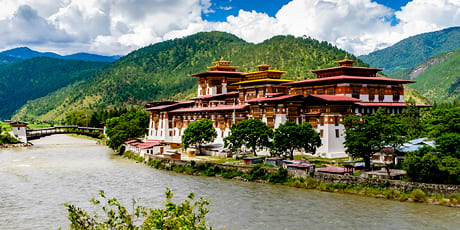 Bhutan
Bhutan
Bhutan, a small Himalayan kingdom nestled between India and China, is a land of breathtaking natural beauty and deeply rooted cultural traditions. Known as the "Land of the Thunder Dragon," Bhutan captivates visitors with its pristine landscapes, from snow-capped mountains and lush valleys to serene rivers and dense forests. Feel at peace among the various dzongs (fortress Buddhist monasteries) as you climb high into the mountains to experience the solitude, reverence, and peace that centuries of monks have sought out. And every visitor to Bhutan will be delighted by the elaborate tsuches (religious festivals) held throughout the year – complete with colorfully masked dancers, drums, and large crowds of gathered locals.
Tours & Packages
- Destinations: Bhutan
- including closed packages
Trip Reviews & Photos
We love hearing your stories and seeing your photos! Check out our entire fan photo gallery and upload your photos.
Highlights
- Festivals
Bhutan’s festivals, or Tsechus, are vibrant celebrations of spirituality and culture, honoring Guru Rinpoche with colorful masked dances, music, and communal joy. The Paro Festival, held in the scenic Paro Valley, features sacred dances and the unveiling of a giant thangka believed to bring blessings. The Thimphu Festival, one of the grandest in the capital, showcases dramatic performances like the Dance of the Stag and the Hounds. At the Wangdi Festival, visitors enjoy unique rituals such as the Ox Dance (Sha Na), alongside local crafts and markets. The Black-Necked Crane Festival, celebrated in the Phobjikha Valley, blends traditional entertainment with conservation awareness, honoring the endangered cranes that winter in the region. These festivals reflect Bhutan's deep spirituality and commitment to tradition.
- Thimphu
Thimphu, Bhutan’s vibrant capital, is a harmonious blend of tradition and modernity, nestled in a picturesque valley surrounded by mountains. As the cultural and administrative heart of the nation, it offers a mix of ancient heritage and contemporary life. Landmarks like the imposing Tashichho Dzong, the towering Buddha Dordenma statue, and the lively weekend market showcase the city’s rich traditions and spiritual depth. With no traffic lights but plenty of welcoming smiles, Thimphu is a uniquely serene capital where Bhutan’s philosophy of happiness is deeply felt.
- Paro Taktsang (Tiger's Nest Monastery)
Perched dramatically on the edge of a sheer cliff, 2,953 ft. above the Paro Valley, Paro Taktsang—commonly known as the Tiger's Nest Monastery—is Bhutan’s most iconic landmark and spiritual site. This sacred Buddhist monastery, shrouded in myth and legend, is said to be where Guru Rinpoche meditated after flying to the site on the back of a tigress. The trek to reach it is both challenging and rewarding, with great views of the valley and the dense pine forests below. Adorned with prayer flags fluttering in the wind and the soft hum of chants, the monastery exudes an air of serenity and divine mystique, making it a must-visit destination in Bhutan.
- Punakha Dzong
Punakha Dzong, known as the "Palace of Great Happiness," is an architectural masterpiece set at the confluence of the Pho Chhu and Mo Chhu rivers. Surrounded by jacaranda trees that bloom in vibrant purple during spring, the dzong is renowned for its intricate woodwork, towering whitewashed walls, and richly decorated interiors. Once Bhutan’s seat of government, it remains a vital religious and cultural site, hosting grand ceremonies and housing sacred relics.
- Environmental Conservation
Bhutan’s commitment to environmental conservation is unparalleled, with over 70% forest cover and a constitutional mandate to preserve at least 60% for future generations. As one of the world’s only carbon-negative countries, Bhutan protects its pristine biodiversity through national parks and biological corridors that shelter rare species like the snow leopard, red panda, and black-necked crane. Eco-friendly trekking routes offer nature lovers the chance to explore unspoiled landscapes while sustainable tourism practices ensure minimal environmental impact. Bhutan is a true haven for both wildlife and environmentally conscious travelers.
Fast Facts
Already booked on one of our packages to Bhutan? See everything you need to know before you go.
| Overview | Capitol: Thimphu |
| Entry requirements | Please see our Entry Requirements page. |
| Staying Healthy | This tour includes some time at high altitudes where travelers may suffer from varying degrees of altitude sickness. Please consult with your physician about any precautions before you depart. |
| Weather | Bhutan’s climate varies significantly by season and elevation. Spring brings warm days (70s) and cool nights, while summer temperatures can climb to the 80s before monsoon rains arrive in July and last through mid-September. |
| What to wear | Pack light, comfortable clothing suitable for layering, and don’t forget a good pair of walking shoes, a sun hat, and an umbrella. Casual attire is perfect for most occasions, so focus on comfort and convenience for your journey. |
| Tipping | Tipping is an appreciated gesture of thanks for excellent service. For your Bhutan Tour Escort, we recommend $10–30 per person per day and $5–25 for your driver. For hotel staff, $1–5 per bag is customary, and $1–3 per night is standard for housekeeping. While airport porterage for one suitcase is included, hotel porterage is not, so plan accordingly. Remember, tips are at your discretion and based on the quality of service you receive. |
| Money & Credit Cards | Bhutan’s currency is the ngultrum (Nu), which cannot be obtained outside the country. You can exchange currency at the Paro airport or your hotel. Credit cards are not widely accepted, though some shops in Thimphu and Paro take Visa or MasterCard. ATMs are rare, so bring enough cash for your needs. Let your credit card provider know your travel plans before departure. Note that traveler’s checks are no longer widely accepted. Be prepared to use local currency or US dollars for most transactions. Always notify your bank prior to departure to avoid any problems using your credit or debit card while traveling. |
| Shopping | There will be plenty of opportunities to shop during your tour. Guides often recommend trusted shops that offer good-quality merchandise—and sometimes the best bathrooms! Inspect your purchases carefully, as most stores do not allow returns or exchanges. If buying religious items, retain the receipt for government approval before departure. Your guide will assist with this process. |
| Electricity & Power Adapters | Bhutan operates on a 230-volt, 50 Hz electrical system. Most sockets use the Type D, Type G, or Type F plug, so it’s a good idea to bring a universal adapter to ensure compatibility with your devices. Voltage converters are generally not necessary for most modern electronics like phones or laptops, as these are typically dual voltage. Power outages can occasionally occur, so consider packing a small power bank to keep your essential devices charged. Learn more about electrical standards around the world. |
| Cell Phones & Internet | Want to take your cell phone, tablet or laptop, but not sure how to get cell service or wifi? Read up on using your cell phone abroad and the top 5 ways to get Internet abroad. |
| Did you know? |
|


 Bhutan’s festivals, or Tsechus, are vibrant celebrations of spirituality and culture, honoring Guru Rinpoche with colorful masked dances, music, and communal joy. The Paro Festival, held in the scenic Paro Valley, features sacred dances and the unveiling of a giant thangka believed to bring blessings. The Thimphu Festival, one of the grandest in the capital, showcases dramatic performances like the Dance of the Stag and the Hounds. At the Wangdi Festival, visitors enjoy unique rituals such as the Ox Dance (Sha Na), alongside local crafts and markets. The Black-Necked Crane Festival, celebrated in the Phobjikha Valley, blends traditional entertainment with conservation awareness, honoring the endangered cranes that winter in the region. These festivals reflect Bhutan's deep spirituality and commitment to tradition.
Bhutan’s festivals, or Tsechus, are vibrant celebrations of spirituality and culture, honoring Guru Rinpoche with colorful masked dances, music, and communal joy. The Paro Festival, held in the scenic Paro Valley, features sacred dances and the unveiling of a giant thangka believed to bring blessings. The Thimphu Festival, one of the grandest in the capital, showcases dramatic performances like the Dance of the Stag and the Hounds. At the Wangdi Festival, visitors enjoy unique rituals such as the Ox Dance (Sha Na), alongside local crafts and markets. The Black-Necked Crane Festival, celebrated in the Phobjikha Valley, blends traditional entertainment with conservation awareness, honoring the endangered cranes that winter in the region. These festivals reflect Bhutan's deep spirituality and commitment to tradition. Thimphu, Bhutan’s vibrant capital, is a harmonious blend of tradition and modernity, nestled in a picturesque valley surrounded by mountains. As the cultural and administrative heart of the nation, it offers a mix of ancient heritage and contemporary life. Landmarks like the imposing Tashichho Dzong, the towering Buddha Dordenma statue, and the lively weekend market showcase the city’s rich traditions and spiritual depth. With no traffic lights but plenty of welcoming smiles, Thimphu is a uniquely serene capital where Bhutan’s philosophy of happiness is deeply felt.
Thimphu, Bhutan’s vibrant capital, is a harmonious blend of tradition and modernity, nestled in a picturesque valley surrounded by mountains. As the cultural and administrative heart of the nation, it offers a mix of ancient heritage and contemporary life. Landmarks like the imposing Tashichho Dzong, the towering Buddha Dordenma statue, and the lively weekend market showcase the city’s rich traditions and spiritual depth. With no traffic lights but plenty of welcoming smiles, Thimphu is a uniquely serene capital where Bhutan’s philosophy of happiness is deeply felt. Perched dramatically on the edge of a sheer cliff, 2,953 ft. above the Paro Valley, Paro Taktsang—commonly known as the Tiger's Nest Monastery—is Bhutan’s most iconic landmark and spiritual site. This sacred Buddhist monastery, shrouded in myth and legend, is said to be where Guru Rinpoche meditated after flying to the site on the back of a tigress. The trek to reach it is both challenging and rewarding, with great views of the valley and the dense pine forests below. Adorned with prayer flags fluttering in the wind and the soft hum of chants, the monastery exudes an air of serenity and divine mystique, making it a must-visit destination in Bhutan.
Perched dramatically on the edge of a sheer cliff, 2,953 ft. above the Paro Valley, Paro Taktsang—commonly known as the Tiger's Nest Monastery—is Bhutan’s most iconic landmark and spiritual site. This sacred Buddhist monastery, shrouded in myth and legend, is said to be where Guru Rinpoche meditated after flying to the site on the back of a tigress. The trek to reach it is both challenging and rewarding, with great views of the valley and the dense pine forests below. Adorned with prayer flags fluttering in the wind and the soft hum of chants, the monastery exudes an air of serenity and divine mystique, making it a must-visit destination in Bhutan. Punakha Dzong, known as the "Palace of Great Happiness," is an architectural masterpiece set at the confluence of the Pho Chhu and Mo Chhu rivers. Surrounded by jacaranda trees that bloom in vibrant purple during spring, the dzong is renowned for its intricate woodwork, towering whitewashed walls, and richly decorated interiors. Once Bhutan’s seat of government, it remains a vital religious and cultural site, hosting grand ceremonies and housing sacred relics.
Punakha Dzong, known as the "Palace of Great Happiness," is an architectural masterpiece set at the confluence of the Pho Chhu and Mo Chhu rivers. Surrounded by jacaranda trees that bloom in vibrant purple during spring, the dzong is renowned for its intricate woodwork, towering whitewashed walls, and richly decorated interiors. Once Bhutan’s seat of government, it remains a vital religious and cultural site, hosting grand ceremonies and housing sacred relics. Bhutan’s commitment to environmental conservation is unparalleled, with over 70% forest cover and a constitutional mandate to preserve at least 60% for future generations. As one of the world’s only carbon-negative countries, Bhutan protects its pristine biodiversity through national parks and biological corridors that shelter rare species like the snow leopard, red panda, and black-necked crane. Eco-friendly trekking routes offer nature lovers the chance to explore unspoiled landscapes while sustainable tourism practices ensure minimal environmental impact. Bhutan is a true haven for both wildlife and environmentally conscious travelers.
Bhutan’s commitment to environmental conservation is unparalleled, with over 70% forest cover and a constitutional mandate to preserve at least 60% for future generations. As one of the world’s only carbon-negative countries, Bhutan protects its pristine biodiversity through national parks and biological corridors that shelter rare species like the snow leopard, red panda, and black-necked crane. Eco-friendly trekking routes offer nature lovers the chance to explore unspoiled landscapes while sustainable tourism practices ensure minimal environmental impact. Bhutan is a true haven for both wildlife and environmentally conscious travelers.